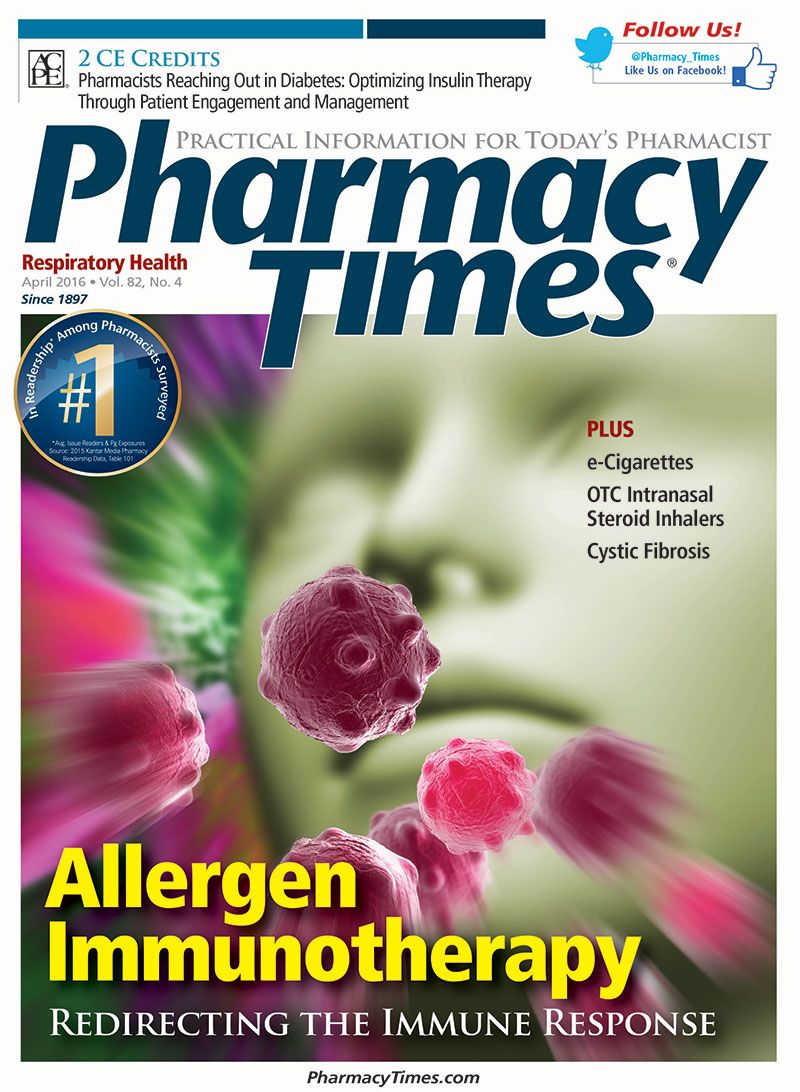
Publication
Article
Pharmacy Times
Self-Care for Disorders Related to Respiratory Health
Which OTC products should these pharmacists recommend?
CASE 1: INTRANASAL STEROIDS
A 40-year-old man presents to the pharmacy seeking advice for his allergies, from which he has suffered for years. He has been taking loratadine 10 mg daily during his seasonal outbreaks. He saw a commercial for a nasal spray that is now available over the counter. He did some research and found that the nasal spray is more effective. What education and recommendation can a pharmacist provide regarding OTC intranasal steroids?
ANSWER
The American Academy of Allergy, Asthma & Immunology and the American College of Allergy, Asthma and Immunology rate intranasal corticosteroids as the most effective class of medication for controlling nasal symptoms of allergic rhinitis.1 Because loratadine is not controlling this patient’s symptoms, he may benefit from an inhaled corticosteroid. Intranasal corticosteroids work best when used every day. Patients should be informed that they need to use the product for several days before relief will be seen, however.
The FDA has approved 2 intranasal corticosteroids for the switch from prescription to over the counter: Nasacort (triamcinolone acetonide) and Flonase (fluticasone propionate) have been available over the counter since July 2014.2,3 The efficacy profiles of these nasal sprays are similar, but patient preference should be considered when a recommendation is made. Many inhaled corticosteroids contain alcohol, which can affect odor and dryness. Triamcinolone acetonide nasal spray does not include alcohol; therefore, it is free of odor and taste. Fluticasone propionate contains phenylethyl alcohol. If patients are complaining of dryness or odor, this may play a role in education. Otherwise, both nasal sprays are effective in controlling seasonal allergies.
Depending on the formulation, 1 to 2 sprays in each nostril daily can be recommended. Each time the patient uses the medication, he should shake the bottle well. He should be educated that minor adverse effects (AEs), such as nasal bleeding and sneezing, are common. Serious AEs include glaucoma, cataracts, infection, and changes in vision.
CASE 2: ALLERGIC RHINITIS
A 35-year-old woman comes to the pharmacy complaining of red, itchy eyes; frequent sneezing; and congestion. She says she has not had a fever and has not tried any medications. She says her symptoms are worst when awakening and improve during the day. She has no chronic conditions and no other diagnoses. She currently takes a prenatal vitamin daily and has no drug allergies. On questioning, she reveals she is currently 22 weeks pregnant. A few years ago, she was taking cetirizine hydrochloride for her allergies, but stopped taking it because her physician said it may not be safe while she is pregnant. She has come to the pharmacy looking for relief from her symptoms. What recommendations can you make?
ANSWER
She appears to be suffering from allergic rhinitis, of which pregnancy is a common cause. Therefore, she should be referred to her primary care physician for an evaluation and a recommendation. If allergic rhinitis is confirmed, many treatment options are available.4 Typically, the FDA categorizes medications based on pregnancy categories. For Category B, animal reproduction studies have failed to demonstrate a risk to the fetus, and there are no adequate and well-controlled studies in pregnant women. Many of the medications used during pregnancy fall into Category B. Cetirizine (Zyrtec), loratadine (Claritin), diphenhydramine (Benadryl), and Cromolyn (NasalCrom) are all Category B medications for allergic rhinitis. Because fexofenadine (Allegra) and nasal corticosteroids are Category C, they are not preferred for use during pregnancy.
The patient should be educated to avoid symptom triggers by keeping doors and windows closed. She should also be instructed on the use of medications for occasional symptom relief and to follow up with her obstetrician for product recommendations.
CASE 3: FEVER
A 66-year-old woman comes to the pharmacy complaining of fever, body aches, chills, congestion, and cough. She claims she has not been feeling well over the past week and has not been able to eat. Her temperature has ranged from 101ºF to 102.7ºF for the past 24 hours. She is also short of breath and has chronic obstructive pulmonary disease (COPD). She has been taking acetaminophen around the clock, which temporarily reduces her fever. She has not had any vaccinations because she thinks they do not work. What would you recommend for this patient’s fever and cold?
ANSWER
Infection, due either to the influenza virus or to bacteria, is the likely cause of this patient’s condition. Because she has COPD and shortness of breath, it is recommended that she go to a physician for evaluation. Other reasons patients should not self-treat for a cold include fevers higher than 101.5ºF for more than 48 hours, chest pain, worsening of symptoms, cardiopulmonary diseases (eg, chronic heart failure), an acquired immunodeficiency syndrome, or advanced age.5
This patient can continue to take acetaminophen; however, she should not take more than the recommended 4000 mg per day. She should be encouraged to contact her primary care physician immediately, especially because she is short of breath, and educated on the importance of vaccinations for preventing illness. Although nonlive vaccinations are not a contraindication for her, because she is not feeling well, it may be advisable for her to recover from her illness before getting a vaccination.
CASE 4: E-CIGARETTES
A 26-year-old woman comes to the pharmacy to refill her prescription for a multivitamin. She states she recently quit smoking because she heard it is harmful to inhale the chemicals in cigarettes, in addition to nicotine. She decided to try the vape pens her friends use. Use of these pens is known as vaping. To her surprise, she has not felt the urge or need to smoke a cigarette in 7 days, and she had been smoking 2 packs per day for 9 years. She wants to know if you have heard anything about vape pens and you have recommendations for her.
ANSWER
According to the CDC, electronic cigarettes (e-cigarettes) are an emerging challenge for public health because the long-term benefits and risks associated with their use are unknown. Currently, e-cigarettes are unregulated in the United States. The FDA has proposed regulating e-cigarettes as tobacco products, but this has not yet happened.6
The patient should be educated that nicotine is an addictive chemical and that because e-cigarettes are not regulated, their use is not recommended for smoking cessation. She should be encouraged to discuss with her physician or pharmacist other ways to quit smoking, such as nicotine replacement therapy or drug therapy.
One study found no difference between e-cigarettes and nicotine patches.7 Therefore, because e-cigarettes are not regulated, it may be safer to recommend nicotine replacement products in the form of gum, lozenges, or patches. These can all be obtained over the counter and are effective for smoking cessation.
Got an interesting question regarding OTC medications? Contact the authors at [email protected] and share the details. Your case could be featured in an upcoming column!
Dr. Mansukhani is a clinical assistant professor at the Ernest Mario School of Pharmacy, Rutgers University, and a transitions-of-care clinical pharmacist at Morristown Medical Center in Morristown, New Jersey. Dr. Bridgeman is a clinical associate professor at the Ernest Mario School of Pharmacy, Rutgers University, and an internal medicine clinical pharmacist at Robert Wood Johnson University Hospital in New Brunswick, New Jersey.
References
- Wallace DV, Dykewicz MS, Bernstein DI, et al; Joint Task Force on Practice; American Academy of Allergy, Asthma & Immunology; American College of Allergy, Asthma and Immunology; Joint Council of Allergy, Asthma and Immunology. The diagnosis and management of rhinitis: an updated practice parameter. J Allergy Clin Immunol. 2008;122(suppl 2):S1-S84. doi: 10.1016/j.jaci.2008.06.003.
- FDA. Nasacort Allergy 24HR approval letter. October 11, 2013. FDA website. www.accessdata.fda.gov/drugsatfda_docs/appletter/2013/020468Orig1s035ltr.pdf. Accessed March 9, 2016.
- FDA. Flonase Allergy Relief approval letter. July 23, 2014. FDA website. www.accessdata.fda.gov/drugsatfda_docs/appletter/2014/205434Orig1s000ltr.pdf. Accessed March 9, 2016.
- American Family Physician. Treatment of allergic rhinitis. aafp.org/afp/2015/1201/p985.html. Published December 1, 2015. Accessed March 9, 2016.
- Scolaro K. Colds and allergy. In: Krinsky DL, Ferreri SP, Hemstreet B, et al (eds). Handbook of Nonprescription Drugs: An Interactive Approach to Self-Care. 18th ed. Washington, DC: American Pharmacists Association; 2015: figure 11-1.
- CDC. e-Cigarettes: an emerging public health challenge. CDC website. cdc.gov/cdcgrandrounds/archives/2015/october2015.htm. Published October 20, 2015. Accessed March 9, 2016.
- Bullen C, Howe C, Laugesen M, et al. Electronic cigarettes for smoking cessation: randomised controlled trial. Lancet. 2014;383(9915):408-409. doi: 10.1016/S0140-6736(14)60146-X.

Newsletter
Stay informed on drug updates, treatment guidelines, and pharmacy practice trends—subscribe to Pharmacy Times for weekly clinical insights.
2 Commerce Drive
Cranbury, NJ 08512
All rights reserved.





